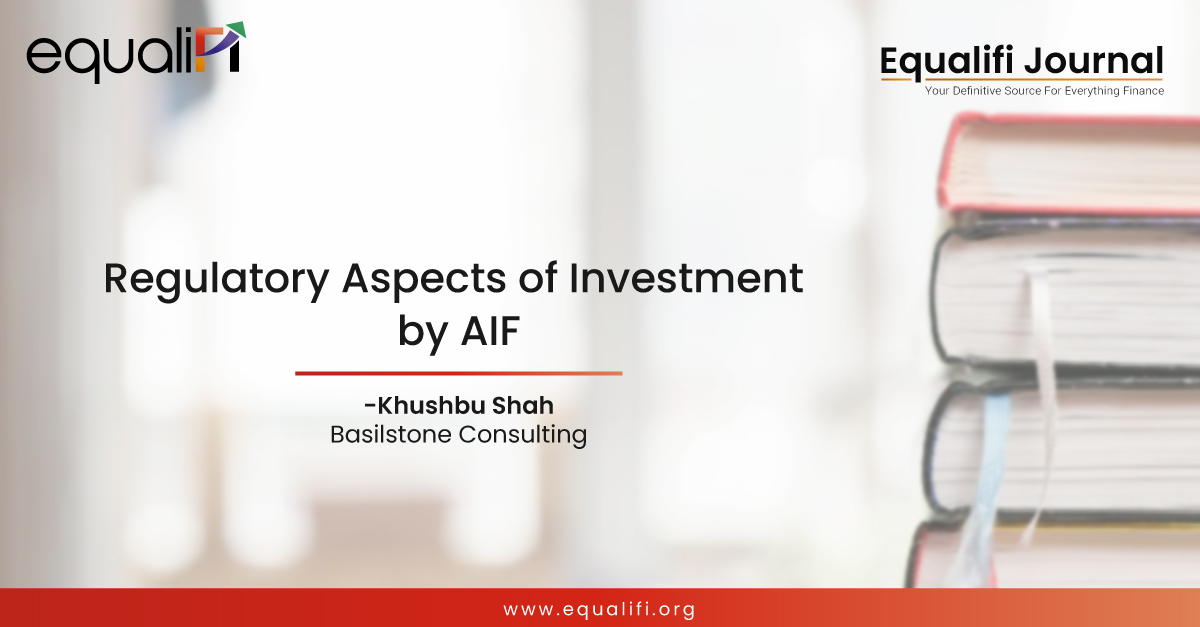Regulatory reconstruction of the AIF Regime in India
Posted on: October 4, 2021 | By: Vivek Mimami- Partner, Khaitan & Co. & Ishita Khare- Senior Associate, Khaitan & Co
The dynamic nature of the alternative investment regime in India has led to its growth in tandem with prevalent market expectations and global standards. Regulatory developments in the AIF space in the year 2021 range across varied themes, such as enhanced governance, relaxed conditions for funds with only accredited investors, and investment conditions. In this article, we have laid down certain pertinent amendments in relation to alternative investment funds (AIFs) that have been introduced by the Securities and Exchange Board of India (SEBI), recently.
Accredited Investors and Large Value Funds:
In consonance with the global funds industry, SEBI has acknowledged the investment expertise and financial knowledge of sophisticated investors by introducing the concept of ‘accredited investors’. An accredited investor is defined under the SEBI (AIF) Regulations 2012 (AIF Regulations) as any person who is granted a certificate of accreditation by an accreditation agency. AIF Regulations have laid down eligibility considerations applicable to different classes of accredited investors. Accredited investors are not subject to the requirement of investing a minimum of INR 1,00,00,000 in an AIF, under the AIF Regulations. AIF Regulations further also provide the concept of ‘deemed accredited investors’, where government, developmental or fund entities of the Centre and State, qualified institutional buyers, Category I foreign portfolio investors (FPI), sovereign wealth funds and multilateral agencies are deemed to be accredited investors, having no requirement to obtain an accreditation certificate.
The global practice regarding accredited investors entailed global regulators acknowledging the know-how and experience possessed by sophisticated investors and drawing comfort from the fact that such specialised investors are capable to effectively negotiate fund terms with managers and appreciate the risks associated with their investment in the funds. Based on the same, SEBI has also granted dispensations to such AIFs that only have accredited investors, i.e., large value funds, where each accredited investor invests minimum INR 70,00,00,000. Large value funds are also permitted to extend their tenure beyond the 2 years extension (unlike other AIFs under the AIF Regulations), subject to terms of the fund documents and conditions specified by SEBI. Large value funds are permitted to invest up to 50% of the investable funds (as opposed to 25%) in an investee company directly or through investment in the units of other AIFs. Similarly, large value funds of Category III AIFs are permitted to invest up to 25% of the investable funds (as opposed to 10%) in an investee company directly or through investment in units of other AIFs.
Large value social venture funds are also not subject to the limitations on grant amount that may be received by them. While globally, bespoke investment vehicles with the sole objective of investing in a single portfolio company are gaining traction as a concept, introduction of a beneficent investment regime for accredited investors and large value funds designed for such accredited investors will aid in the evolution of ‘search funds’ as a concept in India, as well.
Code of Conduct for AIF Parties:
In an endeavour to chart out the gamut of fiduciary responsibilities, duties, and obligations for governing parties of an AIF such as the key management personnel of an AIF, trustee/trustee company, directors of the trustee company, designated partners or directors of the AIFs, managers and key management personnel of managers, SEBI has included codes of conduct in the AIF Regulations for such parties of an AIF, akin to the mutual fund regime in India. The AIF Regulations now require the investment manager and either the trustee /trustee company or the board of directors / designated partners of an AIF to ensure compliance by AIF with the code of conduct prescribed by SEBI. The overarching undertone of the codes of conduct laid down by SEBI encompass aspects such as compliance with applicable law and fund documents, protection of the interest of investors, transparency and disclosures, risk management, and enhanced governance.
Merchant Bankers for AIF PPMs:
SEBI has introduced a new regulatory requirement for SEBI registered merchant bankers to review the private placement memoranda (“PPMs”) of AIFs seeking registration with SEBI under the AIF Regulations, where such PPMs must be filed with SEBI through a merchant banker. Further, SEBI will communicate the required changes/ comments on PPMs to such merchant bankers, who shall be responsible to ensure that such changes are made in the PPM, before the launch of the AIF. Thus, managers looking to launch AIFs after 12 November 2021 must be cognizant of the time and cost considerations that will be relevant to the launch of an AIF, pursuant to this requirement of the PPM being reviewed and submitted by merchant bankers. While this amendment appears to be an endeavour by the regulator to ensure increased oversight in terms of submission of the offering document for AIFs and inclusion of its inputs therein, this additional procedural requirement involving merchant bankers for AIFs seems to draw a parallel between private placement of an AIF’s units and public offering of stocks.
Changes in investment norms for AIFs:
Recently, SEBI has ushered in a host of amendments in the AIF Regulations that impact the investment norms applicable to AIFs. For instance, SEBI revised the range of permissible securities for temporary investments by AIFs by substituting Collateralized Borrowing and Lending Obligation by Triparty Repo Dealing and Settlement and permitting AIFs to make temporary investments from divestment proceeds pending distribution to investors. Category I AIFs are now permitted to invest in Category II AIFs and Category III AIFs may invest in all categories of AIFs. Investment norms have also been widely relaxed for venture capital funds under the AIF Regulations, and the definition of ‘venture capital undertaking’ has been widened to include any company which is not listed on a stock exchange at the time of making the investment, thereby ensuring that Category I AIFs have broader investment avenues.
Amendments were also introduced to the AIF Regulations in terms of investment norms applicable to AIFs investing in other AIFs, wherein if an AIF invests in another AIF, it cannot have AIFs as its investors as well. Pursuant to the foregoing, SEBI clarified that concentration norms for AIFs will account for both direct and indirect holdings of an AIF. Investment by an AIF in another AIF which is managed / sponsored by the same manager / sponsor or their associate will require an approval from 75% of the investors of the investing AIF, by value.
SEBI has been a proactive and responsive regulator with respect to mirroring global practices in the investment funds industry in the Indian AIF regime. While SEBI has been insistent on assuring investor protection, enhancing transparency and instituting governance norms for AIFs on one hand, it has also catalysed the maturation of AIF Regulations to preserve the flexible nature of alternative fund raising. SEBI, in its latest board meeting dated 28 September 2021, have decided to amend the AIF Regulations in a manner that is being welcomed by fund managers and investors. The regulator acknowledged difficulties experienced by open-ended Category III AIFs in adhering with the investment concentration norms under the AIF Regulations, and has substituted the criteria of ‘investable funds’ with ‘net asset value’ in relation to their investment in listed equities of investee companies.
Further, SEBI has also responded favourably to a long-standing demand of the AIF industry by giving a green light to investors of AIFs to make co-investments through the portfolio management route, where the portfolio manager providing co-investment services to investors of AIFs shall invest 100% of the assets under their management in unlisted securities and will be exempted from certain requirements under SEBI (Portfolio Managers) Regulations 2020, including minimum investment amount, minimum net-worth etc. Lastly, in its endeavour to promote the growth of International Financial Service Centre (IFSC) regime in Gujarat International Finance- Tec City (GIFT City), SEBI has also permitted resident Indians (other than individuals) to become constituents of FPIs that are registered as AIFs in IFSCs, provided that such resident Indians shall be sponsor/ manager of the FPI and their contribution in the FPI shall be subject to conditions as specified by SEBI. This move will attract offshore investment in Indian securities markets through the FPI via the AIFs set up in IFSC.
The regulatory framework for AIFs in India promises to grow with the industry expectations and market demands, thus being true to the inherent nature of the investment product itself being malleable enough to evolve and grow in consonance with the growing Indian business milieu. While it is true that the AIF Regulations have come a long way in a decade’s time frame in terms of bolstering the prominence and popularity of Indian AIFs as an investment vehicle for both domestic and global players, it may be expected that Indian shores will emerge as a fortified investment funds domicile at a global level. SEBI has introduced norms to ensure that investors’ rights are protected by way of enhanced monitoring reporting and governance, however, it has also at the same time appreciated that AIF, as a product, is privately negotiated. In light of the fact that units of an AIF are privately placed, managers and investors still hope for more leeway in terms of innovating the AIF route of investment by seeking more flexibility in form of structuring, investment allocation, documentation, and governance for AIFs. Given that both the domestic AIF and IFSC AIF regimes are competing fairly with other investment funds jurisdictions and gaining the confidence of both investors and asset managers across all asset classes, investment strategies and investment structures, it may be hoped that the learnings of both the regulator and stakeholders are effectively incorporated for AIFs in India, so that this regime can attain the next stage of maturation, overtaking other investment regimes, internationally.








